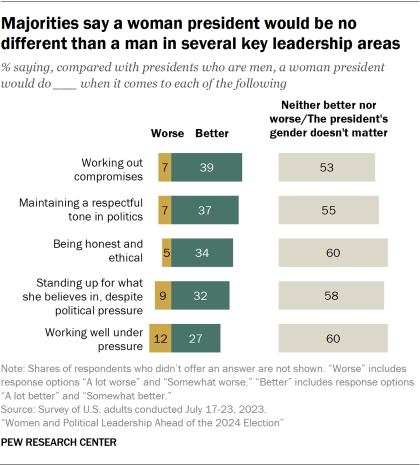
The survey asked whether a woman president would be better, worse, or neither better nor worse than a man when it comes to several leadership traits.
For each trait asked about, majorities say that a woman president would be neither better nor worse or that the president’s gender doesn’t matter.
For those who do see a gender difference, larger shares say a woman president would be better than say she would be worse than a man.
Some 39% say a woman president would be better at working out compromises. A similar share (37%) say a woman would be better at maintaining a respectful tone in politics.
About a third say a woman president would be better than a man at being honest and ethical (34%) and standing up for what she believes in, despite political pressure (32%). Some 27% say a woman would be better at working well under pressure.
By gender
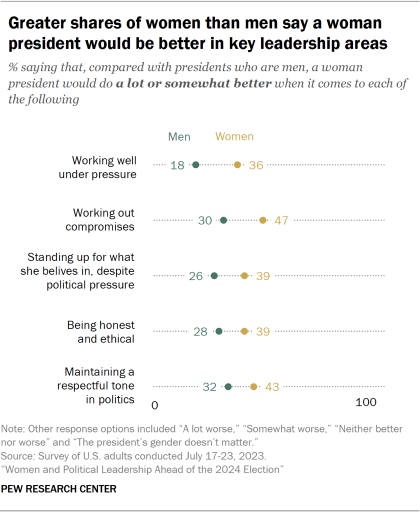
By 11 percentage points or more, women are more likely than men to say that a woman president would be somewhat or a lot better than a man at every leadership trait asked about.
There are particularly large differences between the shares of men and women who say a woman president would be better at working out compromises and working well under pressure.
Nearly half of women (47%) say a woman president would be better at working out compromises. A notably smaller share of men (30%) say the same. And women are twice as likely as men to say that a woman president would be a lot or somewhat better at working well under pressure (36% vs. 18%).
By partisanship
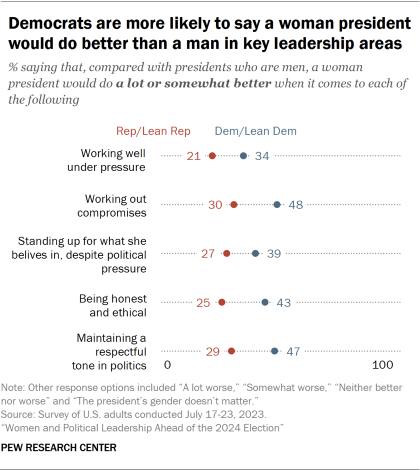
Democrats and Democratic leaners are more likely than Republicans and Republican leaners to say a woman president would do a lot or somewhat better than a man at each leadership trait. By 18 percentage points, Democrats are more likely to say a woman president would be better at working out compromises, maintaining a respectful tone in politics,and being honest and ethical.
Even though greater shares of Democrats say a woman president would be better at these leadership traits, about one-in-five or more Republicans say a woman president would be better than a man at each of the traits asked about. These shares are larger than the shares of Republicans who say a woman would be worse than a man at most of these traits.
Gender differences among Republicans and Democrats
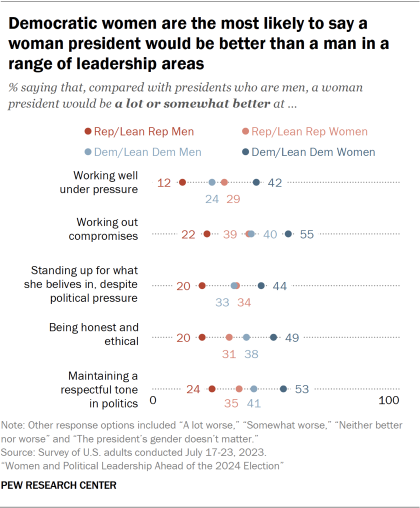
Within each party, women are more likely than men to say that a woman president would be a lot or somewhat better than a man at each leadership trait. Among Republicans, differences between men’s and women’s views are especially large when it comes to working out compromises (22% vs. 39%) and working well under pressure (12% vs. 29%). There are also differences of 11 points or more in the shares of Democratic men and women who say a woman president would be better than a man at each of the traits we asked about.
On every leadership trait, Democratic women are more than twice as likely as Republican men to say that a woman president would be a lot or somewhat better than presidents who are men.
Similar shares of Republican women and Democratic men say a woman president would be better than a man at working out compromises and standing up for what she believes in, despite political pressure.
The only trait for which Republican women (29%) are more likely than Democratic men (24%) to say a woman would do better is working well under pressure.
How a woman president would compare with presidents who are men in handling several policy areas
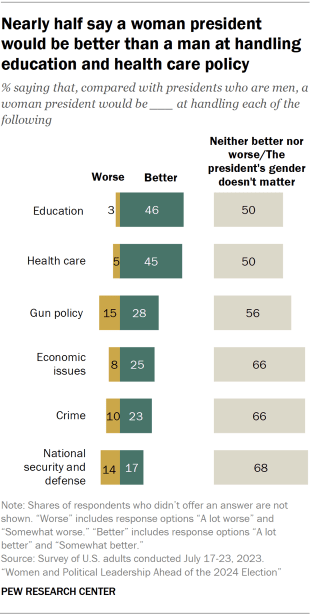
Half or more of Americans say that, when it comes to handling education, health care, gun policy, economic issues, crime, and national security and defense, a woman president would be neither better nor worse than a man or that the president’s gender doesn’t matter.
Among those who do see a gender difference, more say a woman president would be better than say she would be worse than a man at handling most of these policy areas. This is especially the case when it comes to:
- Education: 46% of U.S. adults say that a woman would handle this somewhat or a lot better than presidents who are men; only 3% say a woman would do worse.
- Health care: 45% say a woman president would do better than a man in this area, while just 5% say a woman would do worse.
By gender
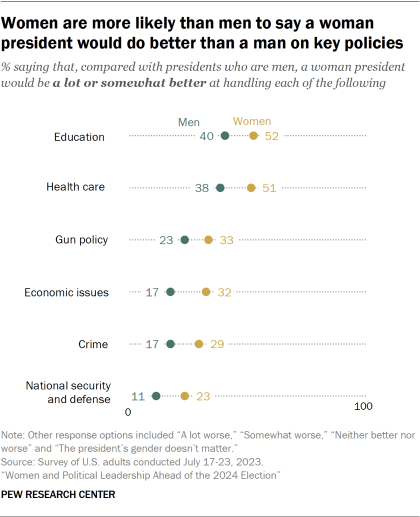
Women are more likely than men to say that a woman president would be a lot or somewhat better than a man at handling every key policy area by a difference of 10 percentage points or more.
When it comes to economic issues and to national security and defense, about twice the share of women as men say that a woman president would do better than a man.
Among both men and women, the policy areas with the largest shares saying a woman president would do better are education and health care.
In turn, the policy area with the smallest shares of both men and women saying a woman president would do better is national security and defense.
By partisanship
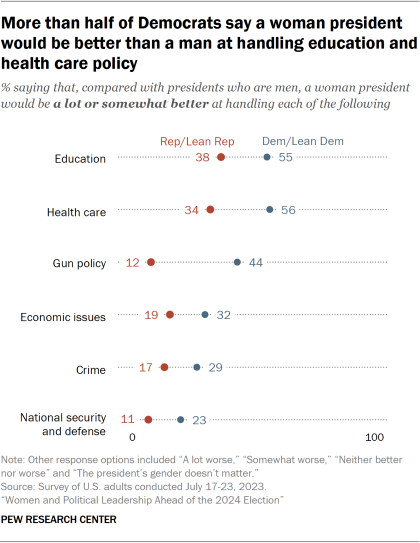
For each policy asked about, Democrats are more likely than Republicans to say that a woman president would do a lot or somewhat better than a man.
The difference is widest when it comes to gun policy. Democrats are about three and a half times more likely than Republicans to say a woman president would do better in this area (44% vs. 12%).
Gender differences among Republicans and Democrats
Among both Republicans and Democrats, women are more likely than men to say that a woman president would do better in all the policy areas asked about.
How a woman president would impact the world’s respect for the U.S.
The survey asked how having a woman as president would impact how the rest of the world sees the United States.
A majority say that having a woman as president would make the U.S. neither more nor less respected or that the president’s gender wouldn’t have an impact (54%).
About one-in-five Americans (22%) say a woman president would make the U.S. a lot or somewhat more respected, and an equal share say this would make the U.S. a lot or somewhat less respected.
Men and women give similar answers to this question.
By partisanship
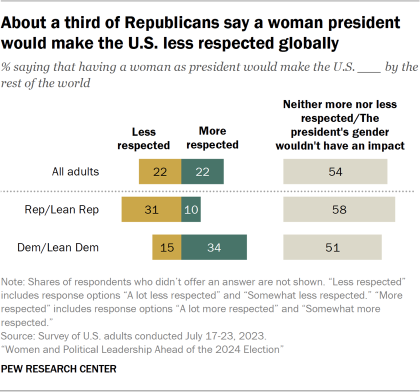
Democrats are more than three times as likely as Republicans to say that a woman president would make the U.S. more respected (34% vs. 10%). In turn, Republicans are about twice as likely as Democrats to say that a woman president would make the U.S. less respected (31% vs. 15%).
Republicans (58%) are also more likely than Democrats (51%) to say that having a woman as president would make the U.S. neither more nor less respected or that the president’s gender would not have an impact.
How important is it that the U.S. elects a woman president?
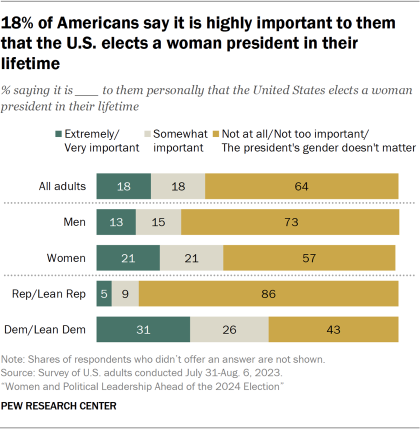
In a separate survey, we asked Americans how important it is to them personally that the U.S. elects a woman president in their lifetime and how likely they think it is that this will happen.
A majority of adults (64%) say that it’s not at all or not too important to them personally that the U.S. elects a woman president in their lifetime or that the president’s gender doesn’t matter.
Some 18% say it’s extremely or very important to them that the U.S. elects a woman president in their lifetime, and the same share says this is somewhat important to them.
There are wider differences on this question by party than by age or gender.
By gender
Women (21%) are more likely than men (13%) to say it is highly important to them that a woman is elected president in their lifetime. In turn, greater shares of men than women say that this is either not at all or not too important to them or that the president’s gender doesn’t matter. However, a majority of both men and women say this.
A quarter of women younger than 50 say this is extremely or very important to them – greater than the shares of women 50 and older (17%) and men of any age (13%) who say the same.
By partisanship
About three-in-ten Democrats (31%) say it is extremely or very important to them that the U.S. elects a woman president in their lifetime, compared with just 5% of Republicans.
In turn, Republicans (86%) are twice as likely as Democrats (43%) to say it is not at all or not too important if they ever see a woman elected U.S. president or that the president’s gender doesn’t matter to them.
Will there be a woman president in the near future?
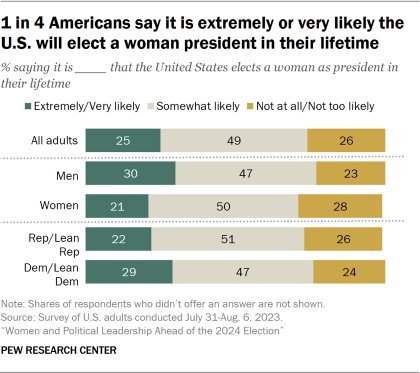
Americans find no consensus on how likely it is that the U.S. will elect a woman in their lifetime. About half of adults (49%) say it is somewhat likely this will happen, a quarter say it is extremely or very likely, and about an equal share (26%) say it is not too or not at all likely.
Among those who say it’s highly important to them that a woman is elected president in their lifetime, 39% say this is extremely or very likely to happen, 41% say it’s somewhat likely, and 20% say it’s not too or not at all likely that they’ll see a woman elected president.
Smaller shares of those who say it’s somewhat important to them that a woman be elected president (23%) or that it’s not important or that the president’s gender doesn’t matter (22%) say it’s highly likely that the U.S. will elect a woman president in their lifetime.
By gender
Greater shares of men (30%) than women (21%) say it is extremely or very likely that there will be a woman president in their lifetime.
Among women, more say this is not too or not at all likely (28%) than say it’s extremely or very likely (21%).
On the other hand, a larger share of men say it is extremely or very likely (30%) than say it is not too or not at all likely (23%).
By partisanship
A slightly larger share of Democrats (29%) than Republicans (22%) say they think it’s likely there will be a woman elected president in their lifetime.




